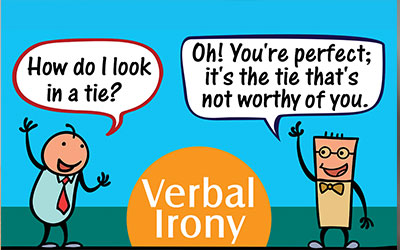Sometimes, what is said and what is meant can be worlds apart – Roopa Banerjee
 “I am so glad the professor moved up the deadline for submission of the essay; I am happy I wouldn’t have to party this weekend.”
“I am so glad the professor moved up the deadline for submission of the essay; I am happy I wouldn’t have to party this weekend.”
It doesn’t sound possible that a person will be happy about not partying on a weekend. But if someone says it, it is irony — a figure of speech in which the intended meaning of words said or written is different from the actual meaning.
The origin of irony is intriguing. It was first used thousands of years ago, in ancient Greece. The word ‘irony’ comes from Eiron, a character in an ancient Greek comedy who feigns stupidity to deceive and put down the boastful Alazon. Both characters pretend to be something other than what they really are. Eiron is not really stupid, while Alazon is far from capable. This contrast between ‘what seems to be’ and ‘what is’ is the root of irony.
Yet irony is distinct from sarcasm. While it is similar inasmuch as it is used to prove a contrary point, it is different because sarcasm is generally used to demean or humiliate the target, unlike irony.
Understanding verbal irony in literature requires analytical skills. The writer or speaker needs to make the distinction clear so there is no misunderstanding of what they are trying to convey.
One of the most famous examples of irony in literature is in William Shakespeare’s Julius Caesar. In the play, Mark Antony repeats the ironical phrase “But Brutus says he (Caesar) was ambitious, And Brutus is an honourable man,” several times.
It is evident that Antony believes Brutus is not honourable as he played a major role in Caesar’s murder. To emphasise this irony, the repetition of this line “And Brutus is an honourable man” is used.
Another example is from William Shakespeare’s great tragedy Macbeth. In the play, Macbeth says: “Here’s our chief guest”. Macbeth is referring to Banquo as an important guest, yet hides his true meaning as Banquo, the man he plans to murder, has just arrived at the feast.
George Bernard Shaw’s Pygmalion has several examples of irony. In one scene, Higgins’s housekeeper asks Prof. Higgins not to swear, and he replies indignantly: “I swear! I never swear. I detest the habit. What the devil do you mean?” The reply is undoubtedly ironic, because Higgins claims to hate swearing, but then immediately swears with elation.
Another interesting example of irony in contemporary literature is the Harry Potter series by J K Rowling. In Harry Potter and the Order of the Phoenix, Harry says: “Yeah, Quirrell was a great teacher. There was just that minor drawback of him having Lord Voldemort sticking out of the back of his head!”
This is classic irony where the first sentence is seemingly innocent and the second is wryly ironic.
There are many examples of verbal irony in daily life. When a teacher says to her pupil with an untidy desk, “Wow, you could win an award for cleanliness!” Or when you leave for work and your car has a flat tyre, it is verbal irony if you say, “What a perfect start to my day!”
Exercise
Below are two statements. Identify which one is irony:
1. Riya stepped out into the hurricane and said, “What great weather we are having!”
2. Riya stepped out into the hurricane and said, “This is terrible weather!”
Answer: 1


























